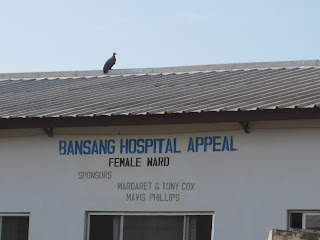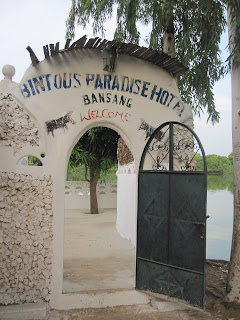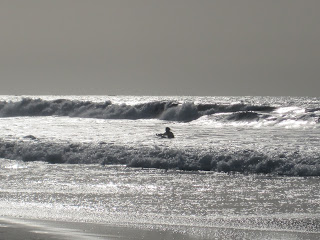Our first Annual Partnership Review and Final Placement
Evaluation was for Simon at the Rural Support Organisation for the Disabled
(RSOD).
We arrived just after 9am, and I was given a quick tour of
the building. The centre is a school where able and disabled nursery children
are schooled together to promote inclusive education. The centre also acts as a
base for women’s literacy classes and as a training centre for disabled people
in the community.
 |
| The centre |
After introductions and prayers we had breakfast (cake,
chicken, meat pies and sausage rolls – definitely not a cornflakes kind of
breakfast!). Once all of that was out the way we were able to begin. The
session included 12 people, a mixture of staff, board members, and association
members, including a number of disabled people and a couple of people who only
spoke Mandinka.
 |
| Attendance - note the thumb prints. |
The session was challenging at times, and the beginning felt
a little bit stilted, but once everyone started participating it really flowed.
I was unsure as to how it would all come together, not having facilitated an
event like this before, but it was fantastic! Ebou and I worked really well
together, and I loved hearing about what RSOD have done over this last year,
what they have learned, what challenges they have faced, and more importantly
what impact they have had on the lives of the people they work with.
 |
| Me working with the board members. |
 |
| What's a session without post-it notes?! |
This year they elected a new board, 7 elected members and 4
co-opted members. The 7 elected members are all female, which is testament to
the work they have done to empower women and prove that women, including
disabled women, can have a voice. They have run adult literacy classes, loads
of group training sessions – both for RSOD staff and community members – and
have encouraged people to learn income generating skills such as soap making
and Omo making (washing powder). They are looking to expand to a little garden
project to support further income generation through vegetable production.
Perhaps the biggest change of all has been their advocacy
work for the rights of disabled people. This has empowered parents to send
their disabled children to school, including sending 10 deaf children to the local
primary school, and has led to disabled people in the community having the
power to stand up for themselves. One lady explained that she now felt
confident enough to tell taxi drivers that she shouldn’t have to pay extra for
her wheelchair, and that asking her to do so was like charging somebody to
bring their legs into the car.
Another lady said that due to the work she had
done with RSOD she now knew that disabled people didn’t have to just sit around
and do nothing, or go out begging, but could make things, and grow things, and
work to support themselves and be included with the rest of the people in their
compounds.
 |
| Imagine sitting on this for more than a few hours... |
I found hearing the stories really moving, and it was amazing
to get out and actually meet and hear from the beneficiaries that VSO and their
partners are working with. I really enjoyed leading the session and felt a huge
sense of achievement at the end of the day. One feedback post it note from a
participant said the thing that they had enjoyed about the day was ‘the manner
and the way it was conducted is what I like most’ which felt very encouraging
to read on day one of doing the Annual Partnership Reviews!
 |
| Positive feedback! |
As we travelled through Basse to leave I was able to get a
few snaps of the place, and check out more of my surroundings. The craziest
thing was the number of vultures soaring over our heads – I have never seen so
many! And it was great to see the rural mix with the urban, with donkey drawn
carts, and cows everywhere. Basse was quite lively, but it was soon time for us
to leave and travel to Bansang to find our next lodgings for the night.
 |
| A main street in Basse. Edwin and Pompeyo - 2 VSO vols - are in the distance. |
 |
| Two boys who wanted their picture taken. |
 |
| Donkey carts were everywhere. |

























































